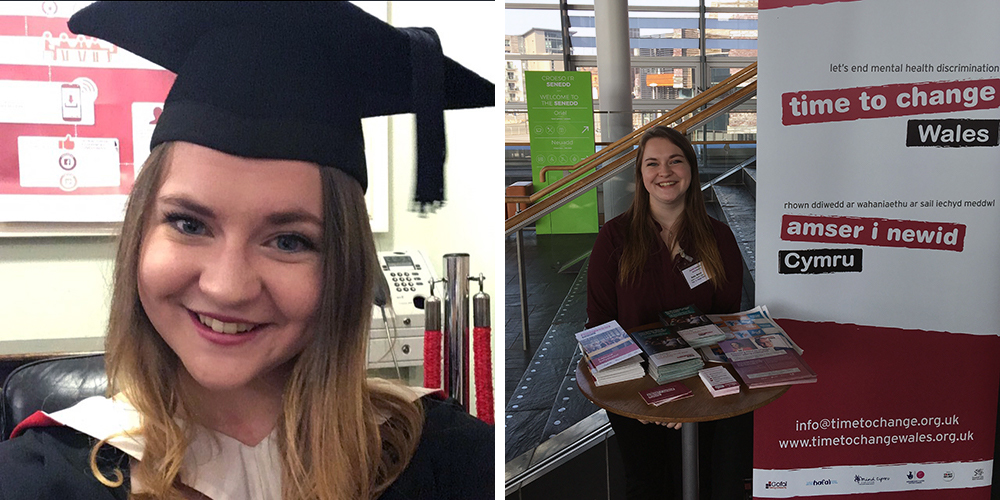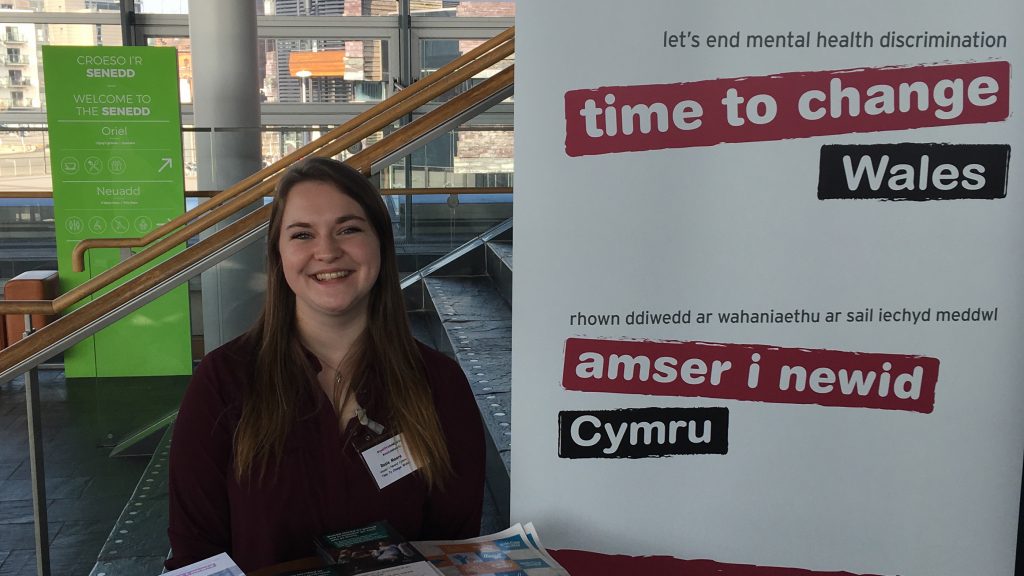Mental Health Week 2020: Everyone has mental health
21 May 2020
This Mental Health Awareness Week we talk to Rosie Moore (BSc 2017, MSc 2020) whose own struggles with mental health have inspired her to campaign to raise awareness, and undertake a PhD in in Suicide Prevention.
I began my Cardiff University journey in 2014 as an undergraduate student in Biomedical Sciences. My father passed away suddenly the year before, and whilst I still wanted to go to university, I needed a familiar environment and my family nearby. However, what I gained from Cardiff University was far more than just a Russel Group education at a commutable distance, but a hugely supportive community of staff, friends and peers whose guidance and patience have allowed me to complete my studies whilst also prioritising my mental health.
I was first diagnosed with depression and anxiety during my second year of university. My first year had passed in the blink of an eye, but as the buzz of new beginnings died down, the dust settled and the work intensified, suddenly a dam seemed to burst in my brain and all the thoughts and feelings and grief that I had been unconsciously holding back, rushed in. I know that the term ‘breakdown’ isn’t generally used anymore, but that’s exactly what it felt like. During that period of my life, all normality and functioning for me literally broke down.
When I was diagnosed, I was given anti-depressants and told that 1 in 4 UK adults will experience a mental illness at some point in their lives. I was simultaneously relieved and horrified that what I was experiencing was so common – if 1 in 4 people have felt this way, I thought, then why isn’t everybody talking about it?! Why didn’t we learn about mental health at school along with fire safety and cycling proficiency?
University counselling helped me beyond belief. The counselling and wellbeing team have provided me with so much support and I’m forever grateful. Also, my tutors were more understanding than I could ever have hoped for, by making it clear that they valued my health more than my grades and by helping with practical things like guiding me through the extenuating circumstances procedure.
After my breakdown, I began reading a lot more about mental health. It was around the same time as I began studying neuroanatomy as part of my course. I realised that whilst I was still interested in human health, I was far more curious about the social determinants of health – and particularly mental health – rather than the pathophysiology. So I decided to pursue a master’s degree in Social Sciences Research Methods, and I’m very excited to be starting my PhD in Suicide Prevention in October.
I passionately believe that more research needs to be done into mental health. You are three times more likely to die by suicide than in a road traffic accident.1 Crucially, like road traffic accidents, suicide can be prevented with the right interventions. So it’s vital we understand how we can reduce the risk of suicide and save lives.

I think mental health awareness has improved exponentially in Wales over the past few years. This is partly due to the ‘Time to Change’ awareness campaign, which aims to break down the stigma of mental health. It is an absolute honour to be a Time to Change volunteer, and it’s so rewarding to start open and frank conversations about mental health and wellbeing with people who may have never spoken about it before – and often don’t realise that everyone has mental health!
If you’re struggling with your mental health talk to someone. Anyone. A friend, your partner, a helpline (Papyrus are a great helpline for young people and have a textline so you don’t even have to speak out loud!) or preferably, a counsellor or GP. Everyone has mental health, so if you talk to somebody about yours, it will help you and it might also make them realise that they can open up about their own mental health – open conversation can break stigma and save lives!
Researchers at Cardiff are working hard to find out more about mental health. They are finding better and faster diagnosis techniques, creating more effective, personalised treatments, and raising awareness and combating stigma. You can help support this research by fundraising or making a donation.
- January 2026
- November 2025
- September 2025
- July 2025
- June 2025
- May 2025
- April 2025
- March 2025
- February 2025
- January 2025
- October 2024
- September 2024
- August 2024
- July 2024
- June 2024
- May 2024
- April 2024
- March 2024
- February 2024
- January 2024
- December 2023
- November 2023
- October 2023
- September 2023
- August 2023
- July 2023
- June 2023
- May 2023
- April 2023
- March 2023
- February 2023
- January 2023
- November 2022
- October 2022
- September 2022
- August 2022
- July 2022
- June 2022
- May 2022
- April 2022
- March 2022
- February 2022
- January 2022
- December 2021
- November 2021
- October 2021
- September 2021
- August 2021
- July 2021
- June 2021
- May 2021
- April 2021
- March 2021
- February 2021
- January 2021
- December 2020
- November 2020
- October 2020
- September 2020
- August 2020
- July 2020
- June 2020
- May 2020
- April 2020
- March 2020
- January 2020
- December 2019
- November 2019
- October 2019
- September 2019
- August 2019
- July 2019
- May 2019
- April 2019
- March 2019
- February 2019
- January 2019
- December 2018
- November 2018
- October 2018
- September 2018
- August 2018
- July 2018
- June 2018
- May 2018
- April 2018
- March 2018
- February 2018
- December 2017
- November 2017
- October 2017
- September 2017
- August 2017
- July 2017
- June 2017
- May 2017
- April 2017
- March 2017
- February 2017
- January 2017
- November 2016
- October 2016
- September 2016
- July 2016
- June 2016
- May 2016
- April 2016
- March 2016
- February 2016
- January 2016
- December 2015
- November 2015
- October 2015
- September 2015
- August 2015
- January 2015
- December 2014
- November 2014
- September 2014
- August 2014
- May 2014